Psychology Assignment on Observational Learning and Behavior
VerifiedAdded on 2021/05/31
|5
|1096
|24
Homework Assignment
AI Summary
This psychology assignment delves into observational learning theory, focusing on the behavioral changes of the author's niece. The paper applies Bandura's social learning theory, particularly the concepts of attention, retention, reproduction, and motivation, to address the niece's aggressive behavior and declining academic performance, attributed to excessive television viewing. The author outlines a plan involving the observation and imitation of a well-performing older sibling. The assignment highlights how observational learning can influence behavior, drawing upon the Bobo Doll experiment to illustrate how individuals learn by observing and imitating others. The assignment also includes references to support the key concepts.
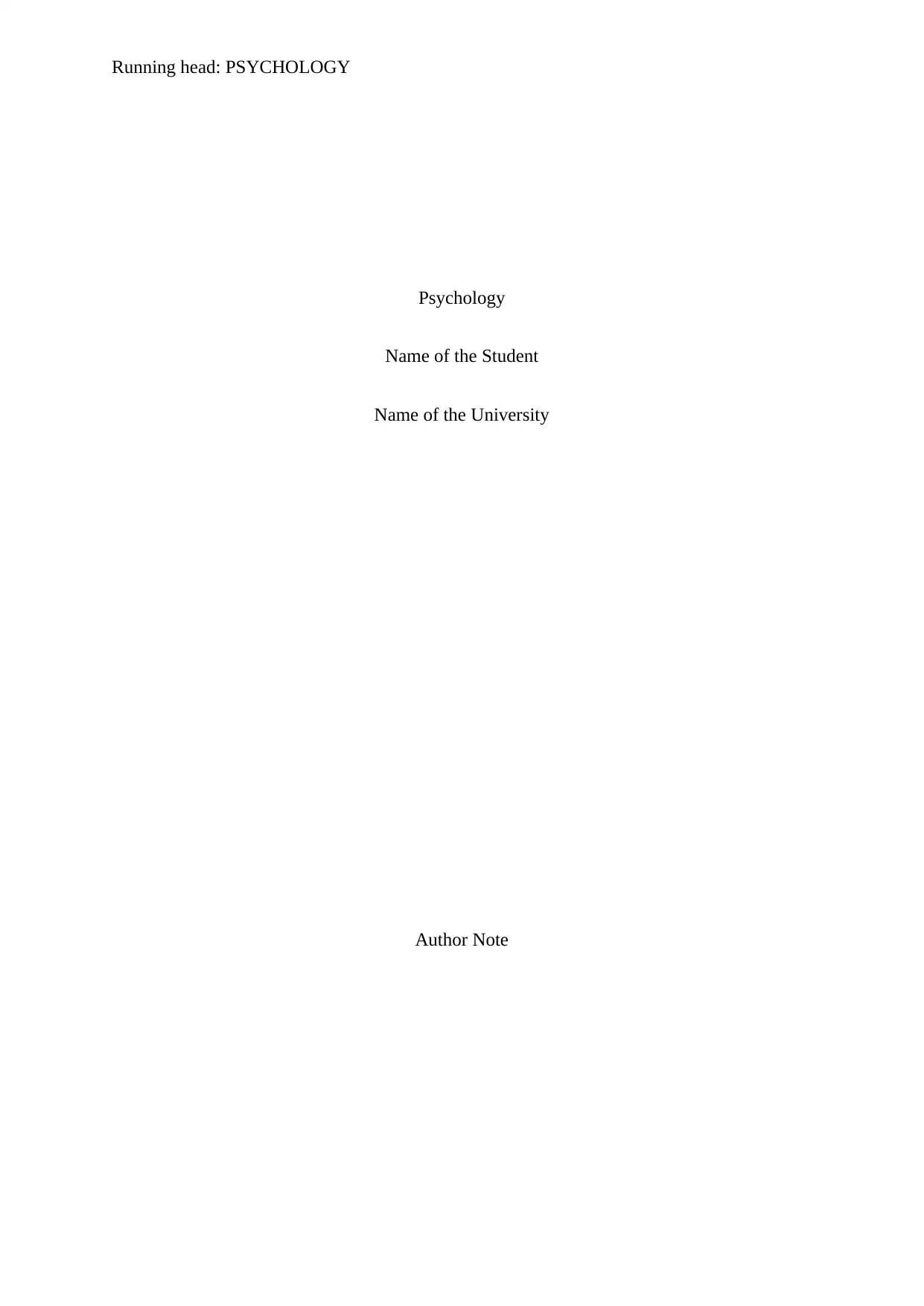
Running head: PSYCHOLOGY
Psychology
Name of the Student
Name of the University
Author Note
Psychology
Name of the Student
Name of the University
Author Note
Paraphrase This Document
Need a fresh take? Get an instant paraphrase of this document with our AI Paraphraser
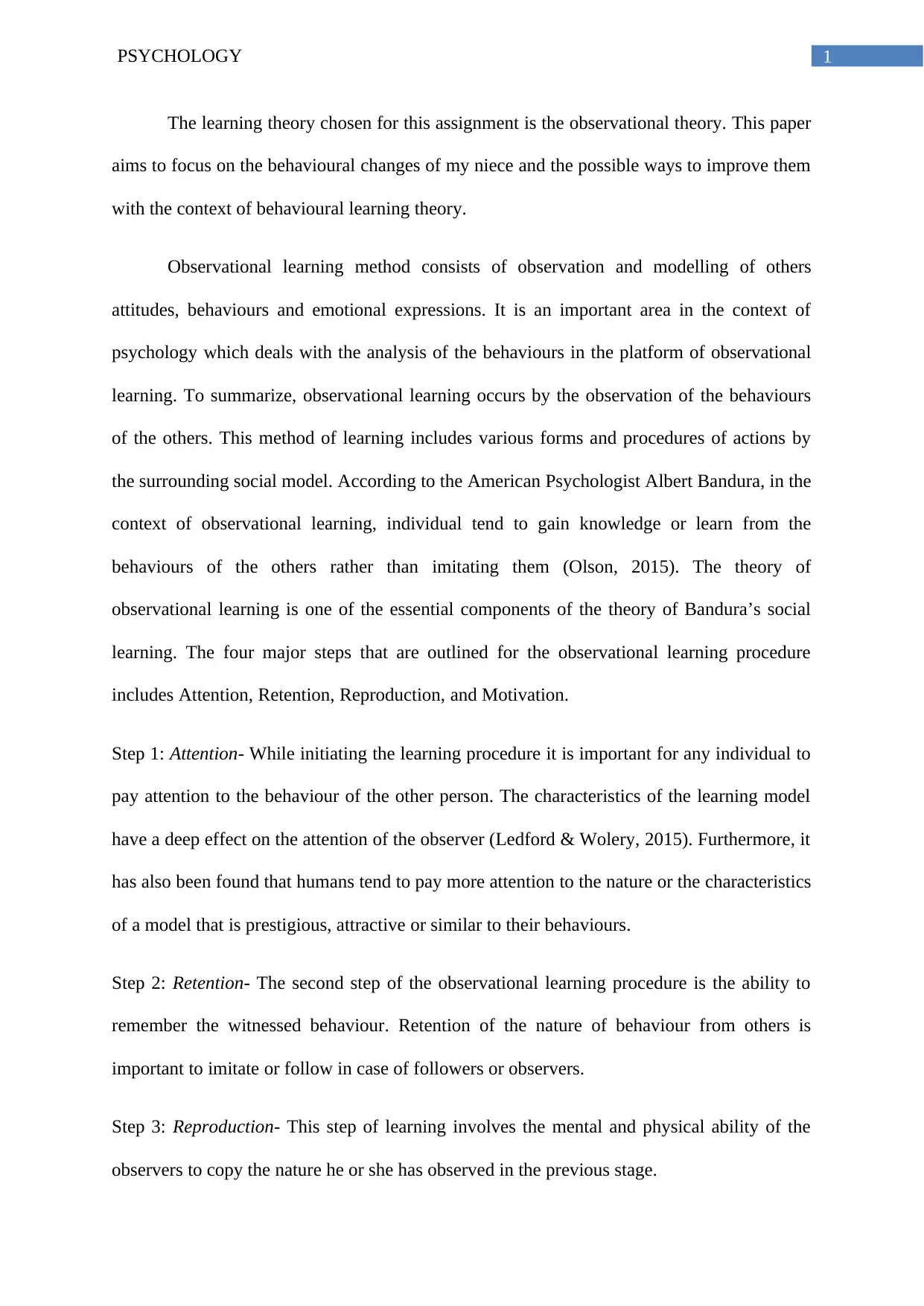
1PSYCHOLOGY
The learning theory chosen for this assignment is the observational theory. This paper
aims to focus on the behavioural changes of my niece and the possible ways to improve them
with the context of behavioural learning theory.
Observational learning method consists of observation and modelling of others
attitudes, behaviours and emotional expressions. It is an important area in the context of
psychology which deals with the analysis of the behaviours in the platform of observational
learning. To summarize, observational learning occurs by the observation of the behaviours
of the others. This method of learning includes various forms and procedures of actions by
the surrounding social model. According to the American Psychologist Albert Bandura, in the
context of observational learning, individual tend to gain knowledge or learn from the
behaviours of the others rather than imitating them (Olson, 2015). The theory of
observational learning is one of the essential components of the theory of Bandura’s social
learning. The four major steps that are outlined for the observational learning procedure
includes Attention, Retention, Reproduction, and Motivation.
Step 1: Attention- While initiating the learning procedure it is important for any individual to
pay attention to the behaviour of the other person. The characteristics of the learning model
have a deep effect on the attention of the observer (Ledford & Wolery, 2015). Furthermore, it
has also been found that humans tend to pay more attention to the nature or the characteristics
of a model that is prestigious, attractive or similar to their behaviours.
Step 2: Retention- The second step of the observational learning procedure is the ability to
remember the witnessed behaviour. Retention of the nature of behaviour from others is
important to imitate or follow in case of followers or observers.
Step 3: Reproduction- This step of learning involves the mental and physical ability of the
observers to copy the nature he or she has observed in the previous stage.
The learning theory chosen for this assignment is the observational theory. This paper
aims to focus on the behavioural changes of my niece and the possible ways to improve them
with the context of behavioural learning theory.
Observational learning method consists of observation and modelling of others
attitudes, behaviours and emotional expressions. It is an important area in the context of
psychology which deals with the analysis of the behaviours in the platform of observational
learning. To summarize, observational learning occurs by the observation of the behaviours
of the others. This method of learning includes various forms and procedures of actions by
the surrounding social model. According to the American Psychologist Albert Bandura, in the
context of observational learning, individual tend to gain knowledge or learn from the
behaviours of the others rather than imitating them (Olson, 2015). The theory of
observational learning is one of the essential components of the theory of Bandura’s social
learning. The four major steps that are outlined for the observational learning procedure
includes Attention, Retention, Reproduction, and Motivation.
Step 1: Attention- While initiating the learning procedure it is important for any individual to
pay attention to the behaviour of the other person. The characteristics of the learning model
have a deep effect on the attention of the observer (Ledford & Wolery, 2015). Furthermore, it
has also been found that humans tend to pay more attention to the nature or the characteristics
of a model that is prestigious, attractive or similar to their behaviours.
Step 2: Retention- The second step of the observational learning procedure is the ability to
remember the witnessed behaviour. Retention of the nature of behaviour from others is
important to imitate or follow in case of followers or observers.
Step 3: Reproduction- This step of learning involves the mental and physical ability of the
observers to copy the nature he or she has observed in the previous stage.
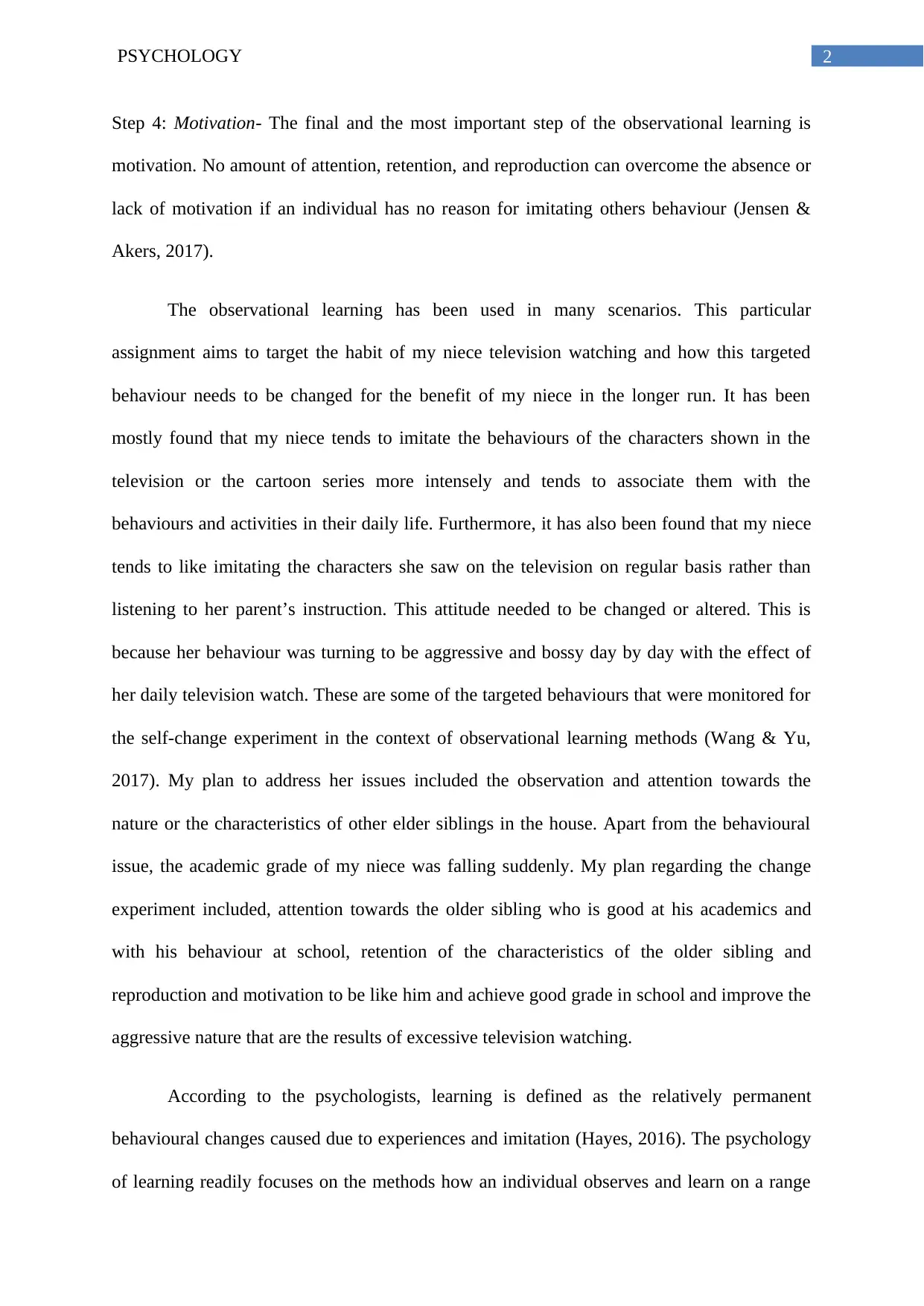
2PSYCHOLOGY
Step 4: Motivation- The final and the most important step of the observational learning is
motivation. No amount of attention, retention, and reproduction can overcome the absence or
lack of motivation if an individual has no reason for imitating others behaviour (Jensen &
Akers, 2017).
The observational learning has been used in many scenarios. This particular
assignment aims to target the habit of my niece television watching and how this targeted
behaviour needs to be changed for the benefit of my niece in the longer run. It has been
mostly found that my niece tends to imitate the behaviours of the characters shown in the
television or the cartoon series more intensely and tends to associate them with the
behaviours and activities in their daily life. Furthermore, it has also been found that my niece
tends to like imitating the characters she saw on the television on regular basis rather than
listening to her parent’s instruction. This attitude needed to be changed or altered. This is
because her behaviour was turning to be aggressive and bossy day by day with the effect of
her daily television watch. These are some of the targeted behaviours that were monitored for
the self-change experiment in the context of observational learning methods (Wang & Yu,
2017). My plan to address her issues included the observation and attention towards the
nature or the characteristics of other elder siblings in the house. Apart from the behavioural
issue, the academic grade of my niece was falling suddenly. My plan regarding the change
experiment included, attention towards the older sibling who is good at his academics and
with his behaviour at school, retention of the characteristics of the older sibling and
reproduction and motivation to be like him and achieve good grade in school and improve the
aggressive nature that are the results of excessive television watching.
According to the psychologists, learning is defined as the relatively permanent
behavioural changes caused due to experiences and imitation (Hayes, 2016). The psychology
of learning readily focuses on the methods how an individual observes and learn on a range
Step 4: Motivation- The final and the most important step of the observational learning is
motivation. No amount of attention, retention, and reproduction can overcome the absence or
lack of motivation if an individual has no reason for imitating others behaviour (Jensen &
Akers, 2017).
The observational learning has been used in many scenarios. This particular
assignment aims to target the habit of my niece television watching and how this targeted
behaviour needs to be changed for the benefit of my niece in the longer run. It has been
mostly found that my niece tends to imitate the behaviours of the characters shown in the
television or the cartoon series more intensely and tends to associate them with the
behaviours and activities in their daily life. Furthermore, it has also been found that my niece
tends to like imitating the characters she saw on the television on regular basis rather than
listening to her parent’s instruction. This attitude needed to be changed or altered. This is
because her behaviour was turning to be aggressive and bossy day by day with the effect of
her daily television watch. These are some of the targeted behaviours that were monitored for
the self-change experiment in the context of observational learning methods (Wang & Yu,
2017). My plan to address her issues included the observation and attention towards the
nature or the characteristics of other elder siblings in the house. Apart from the behavioural
issue, the academic grade of my niece was falling suddenly. My plan regarding the change
experiment included, attention towards the older sibling who is good at his academics and
with his behaviour at school, retention of the characteristics of the older sibling and
reproduction and motivation to be like him and achieve good grade in school and improve the
aggressive nature that are the results of excessive television watching.
According to the psychologists, learning is defined as the relatively permanent
behavioural changes caused due to experiences and imitation (Hayes, 2016). The psychology
of learning readily focuses on the methods how an individual observes and learn on a range
⊘ This is a preview!⊘
Do you want full access?
Subscribe today to unlock all pages.

Trusted by 1+ million students worldwide
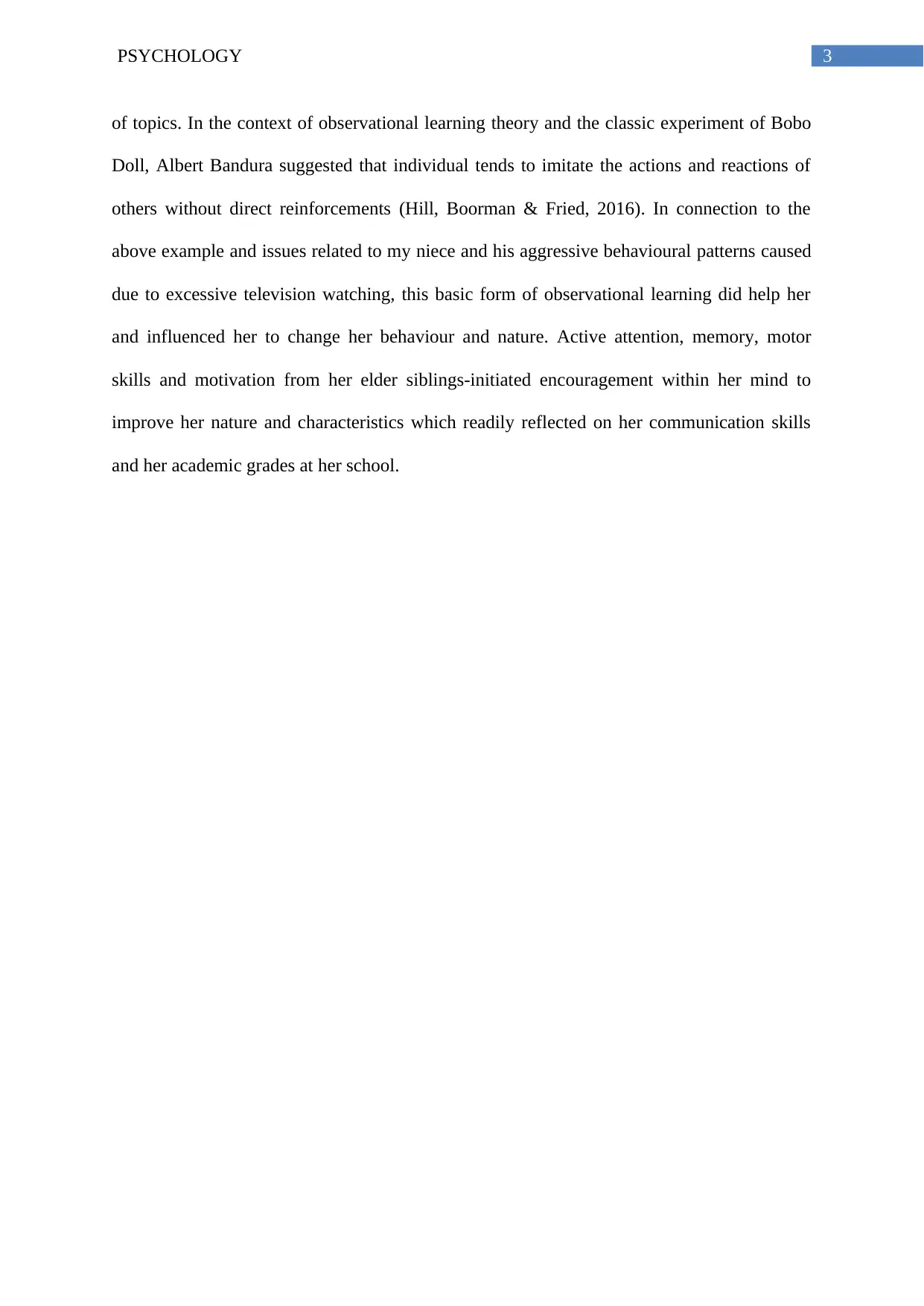
3PSYCHOLOGY
of topics. In the context of observational learning theory and the classic experiment of Bobo
Doll, Albert Bandura suggested that individual tends to imitate the actions and reactions of
others without direct reinforcements (Hill, Boorman & Fried, 2016). In connection to the
above example and issues related to my niece and his aggressive behavioural patterns caused
due to excessive television watching, this basic form of observational learning did help her
and influenced her to change her behaviour and nature. Active attention, memory, motor
skills and motivation from her elder siblings-initiated encouragement within her mind to
improve her nature and characteristics which readily reflected on her communication skills
and her academic grades at her school.
of topics. In the context of observational learning theory and the classic experiment of Bobo
Doll, Albert Bandura suggested that individual tends to imitate the actions and reactions of
others without direct reinforcements (Hill, Boorman & Fried, 2016). In connection to the
above example and issues related to my niece and his aggressive behavioural patterns caused
due to excessive television watching, this basic form of observational learning did help her
and influenced her to change her behaviour and nature. Active attention, memory, motor
skills and motivation from her elder siblings-initiated encouragement within her mind to
improve her nature and characteristics which readily reflected on her communication skills
and her academic grades at her school.
Paraphrase This Document
Need a fresh take? Get an instant paraphrase of this document with our AI Paraphraser
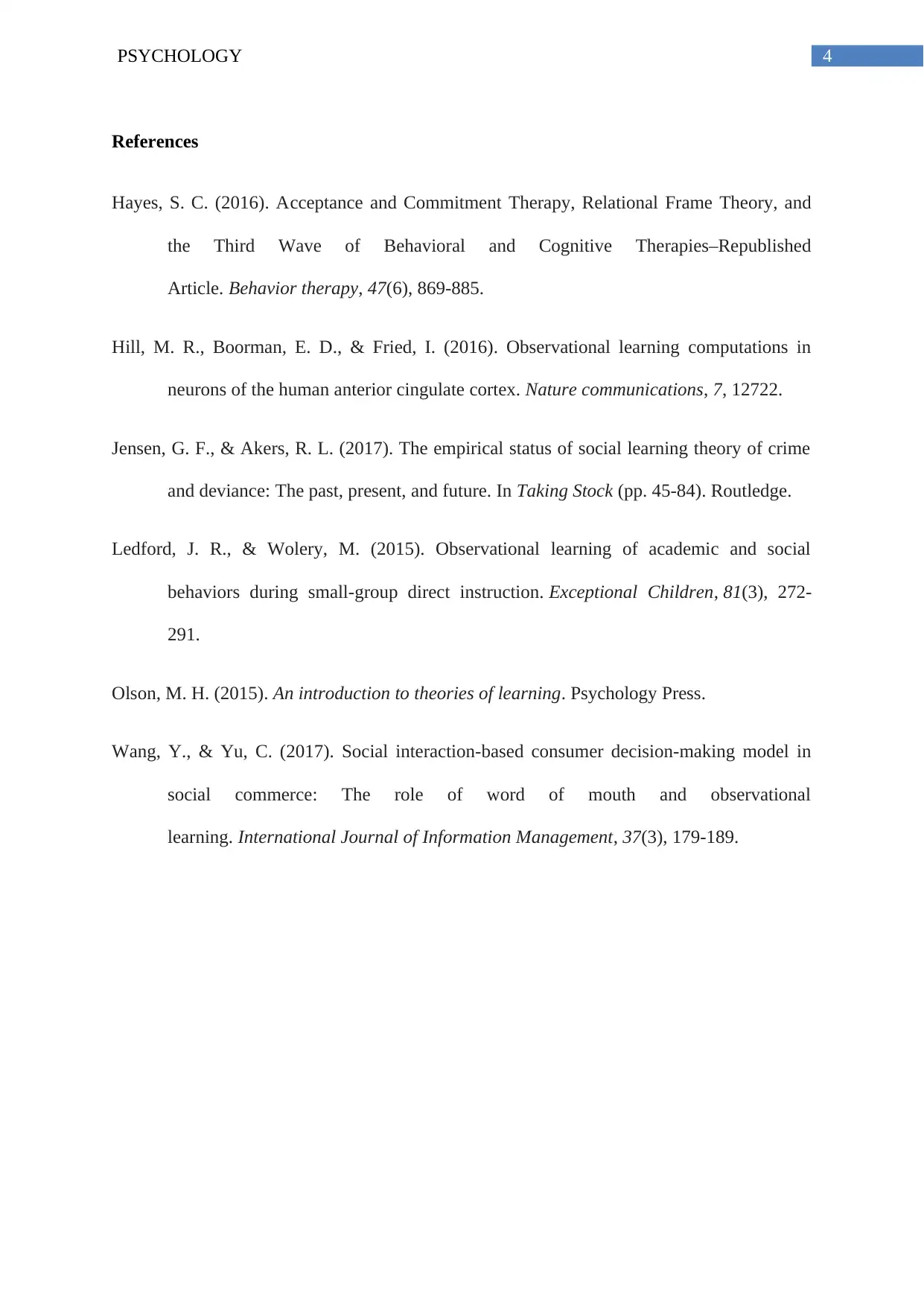
4PSYCHOLOGY
References
Hayes, S. C. (2016). Acceptance and Commitment Therapy, Relational Frame Theory, and
the Third Wave of Behavioral and Cognitive Therapies–Republished
Article. Behavior therapy, 47(6), 869-885.
Hill, M. R., Boorman, E. D., & Fried, I. (2016). Observational learning computations in
neurons of the human anterior cingulate cortex. Nature communications, 7, 12722.
Jensen, G. F., & Akers, R. L. (2017). The empirical status of social learning theory of crime
and deviance: The past, present, and future. In Taking Stock (pp. 45-84). Routledge.
Ledford, J. R., & Wolery, M. (2015). Observational learning of academic and social
behaviors during small-group direct instruction. Exceptional Children, 81(3), 272-
291.
Olson, M. H. (2015). An introduction to theories of learning. Psychology Press.
Wang, Y., & Yu, C. (2017). Social interaction-based consumer decision-making model in
social commerce: The role of word of mouth and observational
learning. International Journal of Information Management, 37(3), 179-189.
References
Hayes, S. C. (2016). Acceptance and Commitment Therapy, Relational Frame Theory, and
the Third Wave of Behavioral and Cognitive Therapies–Republished
Article. Behavior therapy, 47(6), 869-885.
Hill, M. R., Boorman, E. D., & Fried, I. (2016). Observational learning computations in
neurons of the human anterior cingulate cortex. Nature communications, 7, 12722.
Jensen, G. F., & Akers, R. L. (2017). The empirical status of social learning theory of crime
and deviance: The past, present, and future. In Taking Stock (pp. 45-84). Routledge.
Ledford, J. R., & Wolery, M. (2015). Observational learning of academic and social
behaviors during small-group direct instruction. Exceptional Children, 81(3), 272-
291.
Olson, M. H. (2015). An introduction to theories of learning. Psychology Press.
Wang, Y., & Yu, C. (2017). Social interaction-based consumer decision-making model in
social commerce: The role of word of mouth and observational
learning. International Journal of Information Management, 37(3), 179-189.
1 out of 5
Related Documents
Your All-in-One AI-Powered Toolkit for Academic Success.
+13062052269
info@desklib.com
Available 24*7 on WhatsApp / Email
![[object Object]](/_next/static/media/star-bottom.7253800d.svg)
Unlock your academic potential
Copyright © 2020–2025 A2Z Services. All Rights Reserved. Developed and managed by ZUCOL.





